Who your neighbor is and how you should treat them were topics addressed by keynote speaker Lisa Sharon Harper at Saturday's Summit on Race, Poverty and Inequality held at the Henderson Fine Arts Center.
Poverty

The first thing the new Pope Francis said to the world in St. Peter's Square when he accepted the papacy was "I am a sinner." In a final mass of one million people in Philadelphia, the last words Francis spoke to the American people were, "Please pray for me; don't forget!"
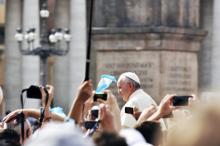
As one human family, it’s time to raise our moral voices.
As Pope Francis has illustrated, true faith is not a disengagement from the challenges of the world but an embrace of those very challenges.
The truth is there is no gospel that is not social; no gospel that relieves us of our call to love our neighbors as ourselves; no gospel that lives outside God’s admonition to serve the least of these. Pope Francis has made this clear, and for that we thank him.
In the history of the United States, a moral critique has always been at the center of any challenge to the structural sins of society—slavery, the denial of women’s rights, the denial of labor rights, the denial of equal protection under the law, the denial of voting rights, and the promulgation of unchecked militarism. We have never overcome any of these evils without a moral critique that challenged their grip on the heart and imagination of our society.

Stunning is the word that most comes to me after Pope Francis' two-day visit to Washington, D.C. The country and the media was reveling in his presence, using language like "amazing," "incredible," and "wonderful" in response to this extraordinary moral leader who literally transformed our public discourse in the 48 hours he was in the nation's capital. What these two extraordinary days mean going forward is the big question on all our hearts and minds.

The Pope is visiting the US this week to make the case that we should take climate change seriously and start doing something about it. He is really making the case that we should change our paradigm from one of individual self-fulfillment to one of “we’re all in this together,” from individual salvation to collective salvation of our earthly home. This has far-reaching implications. We need to be concerned about what’s happening to the earth as a whole, to humanity as a whole, and not just to our own family, town, state, country.

Next week, the conversation will change in America. All the media attention recently given to political figures will now shift to a moral leader who is changing the global public discussion about what is compassionate, just, good, and right -- and Christian.
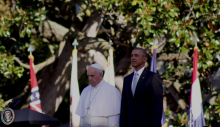
Stunning is the word that most comes to me after Pope Francis’ two-day visit to Washington, D.C. The country and the media was reveling in his presence, using language like “amazing,” “incredible,” and “wonderful” in response to this extraordinary moral leader who literally transformed our public discourse in the 48 hours he was in the nation’s capital. What these two extraordinary days mean going forward is the big question on all our hearts and minds.
At the formal welcoming ceremony on the South Lawn at the White House, a very traditional template was transformed by the “Vicar of Christ,” whose presence turned everyone’s language to one reference after another to those Christ called “the least of these” in the 25th chapter of Matthew. Never have I heard the most vulnerable being the most talked about in this city.
President Obama began the pope’s visit with these words, “What a beautiful day the Lord has made.”
Indeed. Then Pope Francis introduced himself to America as “a son of an immigrant family” who was “happy to be a guest in this country, which was largely built by such families.”
Point made.

On the eve of Yom Kippur and Pope Francis’ arrival to the United States, more than 100 Christian, Muslim, and Jewish faith leaders gathered at the National Press Club to participate in the Interfaith Religious Leaders Summit: End Hunger by 2030, hosted by Bread for the World. Participants shared a meal around tables as they reflected on their faith traditions around hunger and poverty, discussed how to best achieve a positive shift in U.S. national priorities by 2017, and publicly committed themselves and their faith communities to help end hunger by 2030.
The summit began with a reception during which everyone — from heads of churches to CEOs of faith-based organizations — shared introductions with new partners and reunited with old friends. Rev. Carlos Malavé of Christian Churches Together greeted everyone with a welcome.
“Tonight we come together as people of faith. If we gather together, as we are tonight, and we commit to each other in this task, we will certainly achieve everything that God is calling us to do,” he said.

AS THE SEASON turned from summer to fall, I was reflecting again about Sojourners’ vocation, the focus of our mission and ministry.
Matthew 25:31-46 is my own conversion text, the scripture that brought me to Christ a long time ago out of the radical student movement. It’s also been a converting text for many others here at Sojourners over the years.
The 25th chapter of Matthew’s gospel has been foundational to Sojourners from the very beginning of the Sojourners community more than 40 years ago. But I am realizing that Matthew 25 is not only foundational for us, it is really our vocational text. In other words, it shapes not just what we believe and what we stand for, but also what we do as an organization—the issues we address, the campaigns we get involved in, the statements we sign, the coalitions we join, and much more.
In that sense, I’ve been thinking about Matthew 25 in relation to issues of organizational stewardship and sustainability. Autumn is always a busy season for me and for Sojourners. Faced with many invitations, requests, and opportunities to make a positive impact on a variety of issues, how do we decide where and how to focus our ministry, energy, staff, time, and gifts? How do we be good stewards of our calling? I think that Matthew 25:31-46 provides the answer. The key moment in the passage is when Jesus says:
I was hungry and you gave me food, I was thirsty and you gave me something to drink, I was a stranger and you welcomed me, I was naked and you gave me clothing, I was sick and you took care of me, I was in prison and you visited me ... Just as you did it to one of the least of these who are members of my family, you did it to me.
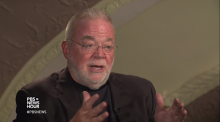
Pope Francis’ strident critique of “unbridled capitalism” has turned heads across the globe. Ahead of his upcoming visit to the United States, American politicians, religious leaders, and laypeople are eager to hear how Pope Francis thinks about economics.
Economics correspondent Paul Solman spoke with Jim Wallis and others in a segment for PBS Newshour about why the pope wants us to stop worshiping capitalism.
Jim Wallis explained how Pope Francis’ critique of capitalism matches God’s vision for the world, as well as the ministry and example of Jesus:
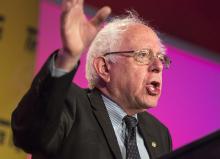
Sen. Bernie Sanders spoke Sept. 14 at an evangelical school where he framed his fight against wealth and income inequality in terms of morality and justice.
Sanders, a Vermont independent running for the Democratic presidential nomination, conceded that many in the audience at Liberty University disagree with his support for abortion rights and gay marriage. But he suggested they might agree that, at a time when “a handful of people have wealth beyond comprehension,” other people shouldn’t have to struggle to feed their families, put a roof over their heads, or visit a doctor.
“When we talk about morality and when we talk about justice, we have to, in my view, understand that there is no justice when so few have so much and so many have so little,” he said to applause from the audience of nearly 12,000.

The vituperative attacks on the War on Poverty sound a little gleeful or mean-spirited or nutty—sometimes all three. A quick review of recent press coverage would lead almost anyone to think that Head Start, Legal Services, community health centers, food stamps, ESEA Title I support for education, the Job Corps, and a host of other programs had no connection to the War on Poverty but materialized sui generis to provide vital services to the poor.
1. Can the Evangelical Left Rise Again?
“The Evangelical left, once a substantial contingent of American life, is now seemingly small and powerless compared to its rightwing counterpart.”
2. Why Every Church Needs a Drag Queen
Nadia Bolz-Weber, everyone’s favorite tattoo-sporting, grace-spouting priest, is back with a new book, Accidental Saints.
3. One Novel Way to Bring Healthcare to Poor Neighborhoods
A local neighborhood health center believes it has developed an approach that works for their clients in poverty — partnering with a local grocery story to combine the shopping and medical experience into one outing.

Even on a local scale, problems like poverty and hunger can overwhelm our imaginations. My own city of Lancaster, Pa., is like countless others. Pockets of true poverty cluster in the old city and dot the countryside. Affluent developments surround the city, while hip new housing is popping up in the center of the city. An impressive urban revitalization campaign has transformed the city’s image, making downtown an attractive place to eat, shop, and play.
Recently, however, a study by Franklin and Marshall College has shown that Lancaster’s resurgence has not helped its poorest residents. Just the opposite has occurred. Between 2000 and 2013, per capita income has grown by 20 percent in the city’s center while it has declined in every other section. What looks like progress from the outside contradicts the harsh reality that thousands experience.
It’s a typical scenario, in which outcomes such as life expectancy and high school completion rates vary dramatically, even in adjacent zip codes and school districts. Faced with such stubborn realities, many individuals feel at a loss concerning how to make a difference.

Raising Themselves
The film Know How, a musical written and acted by foster-care youth, tells interwoven stories of coming of age within a dysfunctional system, the losses and dangers these young people face, and their against-the-odds struggle to persevere. First Run Features
Beyond the Food Drive
In Charity Detox: What Charity Would Look Like If We Cared About Results, Robert D. Lupton asserts that poverty must be addressed “through development, not through one-way giving.” With anecdotes and examples, he explains development strategies such as fund reallocation, reciprocal exchange models, and neighborhood reconciliation. Harper One

THE DEMOCRATIC REPUBLIC of Congo is one of the world’s poorest countries. In 2014, Congo ranked 186 out of 187 on the United Nations’ human development index—vying with Niger for the bottom of the list.
Yet Congo is extremely rich in soil, water, forests, and minerals. Diamonds, copper, gold, oil, uranium, and coltan are all mined, purchased, and traded from the DRC.
Coltan is the ore used in electronic devices. The so call “war of coltan” in the mineral-rich eastern Congo has left millions dead and more than a million women raped. Transnational corporations are able to exert extreme pressure on Congo’s weak government and economy. As a result, the country’s natural resources have become an important factor in increasing poverty and violence rather than wealth and development.
The Catholic bishops in Congo (about half of the country’s population is Catholic) repeatedly have denounced three specific kinds of evil: a climate favoring genocide, outbreaks of religious fundamentalism, and a push toward Balkanization.
Sébastien Muyengo, author of In the Land of Gold and Blood, is the Catholic bishop of Uvira in eastern Congo. As a result of the mineral wars, he writes, the country’s poverty has become a mental, human, and structural poverty, rather than predominantly material. Yet Congo has resources the rest of the world wants.
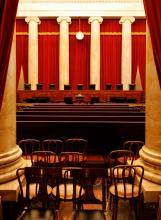
THIS SUMMER’S ATTEMPT to dismantle the Affordable Care Act began as the very height of frivolous lawsuits. Cooked up with the help of the Competitive Enterprise Institute, a libertarian think tank, the case (King v. Burwell) depended upon a very narrow reading of four words in Section 36B of the ACA: “established by the State.”
Essentially, Obamacare foes argued that Congress intended to provide health-care subsidies (or tax credits) only to those Americans living in states with state-operated insurance exchanges. Those who lived in states without exchanges—including Florida, Texas, Wisconsin, and others—and were, therefore, dependent upon the federal exchange would be ineligible for subsidies.
Of course, Congress intended no such thing—as the Supreme Court upheld. Throughout dozens of hearings and hundreds of hours of debate, it was clear that ACA subsidies would be available to every American, regardless of what state they lived in.
In a 6-3 ruling, the court rejected King, with Chief Justice Roberts explaining, “A fair reading of legislation demands a fair understanding of the legislative plan. Congress passed the Affordable Care Act to improve health insurance markets, not to destroy them.”
Had the suit carried the day, 6.4 million Americans would have lost their subsidies.
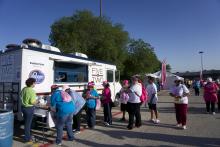
Faith-based food trucks are building momentum across the country. In St. Paul, Minn., Lutheran pastor Margaret Kelly’s church is actually a food truck, providing free food and prayers to homeless and impoverished members of the community.
Back in Texas, the Chow Train in San Antonio has been making national headlines for fearlessly serving homeless residents despite a $2,000 fine in April for serving food from the back of a private vehicle.

On July 21 and 22, the Vatican hosts two conferences on human trafficking and climate change, bringing the mayors of major cities — including several in the U.S. — to Rome for the events. What do human trafficking and climate change have to do with each other? And what does Catholicism have to do with them? Let us explain.
Q: Why is the Vatican concerned with human trafficking and climate change?
A: If Pope Francis has two pet issues, they are human trafficking and climate change. Since the first year of his papacy he has spoken against human trafficking, calling it “a crime against humanity” and lamenting it as modern slavery. It’s an even bet that when the pope addresses the United Nations in late September he will hammer it as one of the crucial issues of our time. Ditto on climate change. In June, the pontiff published his encyclical — the highest teaching of the church — on climate change.
“Our home is being ruined and that hurts everyone, especially the poorest among us,” Francis said just before the publication of the encyclical.

IN A BID to relive our traveling days, my best friend from college and I took a weekend road trip to Berea, Ky., to check out a folk music festival. We got to be dancing fools again for one beautiful, moonlit night, imbibing hippie music to our hearts’ content.
We also got a heart full of something else—a little thing called the American Dream.
In addition to being home to a cool new music festival, that little holler in Kentucky is home to Berea College. I’ve stepped foot on more than 100 campuses in my 10-plus years running Interfaith Youth Core. Berea is unique.
Maybe it’s because it was started in 1855 by a slave owner’s son as an interracial, co-educational school seeking to live out the school’s motto, drawn from the book of Acts, “God has made of one blood all peoples of the earth.” Maybe it’s because the admission requirements include being smart, being willing to work hard, and being poor. Maybe it’s because the tuition is free. Maybe it’s because all students have a 10-hour-a-week campus job, ranging from office work to janitorial work.
Yes, you read all that right. A man whose family owned slaves took the Bible seriously enough to risk his life to start a college that educated blacks and whites and men and women, together, a decade before the civil war came to a close.